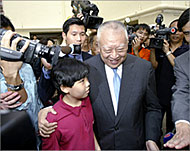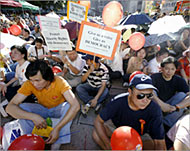HK’s Tung: In the line of fire
Hong Kong’s embattled Chief Executive Tung Chee-hwa said on Saturday that Chinese President Hu Jintao and Premier Wen Jiabao have “total confidence” in him and his government following talks with the two leaders, but that will do little to calm the public demands for his removal.

Tung was on his first visit to Beijing since 500,000 Hong Kong citizens took to the streets to protest proposed security laws and his government’s performance on 1 July.
“They emphasised that they have total confidence in me and the SAR (Special Autonomous Region) government in taking Hong Kong forward and (completing) Hong Kong’s economic restructuring,” Tung told journalists following his meetings.
Two of the most unpopular members of Tung’s cabinet also resigned this week, deepening the worst political crisis in the territory since the former British colony was handed back to China in 1997.
“I do want to say we are facing some really serious challenges and at the end of the day how Hong Kong becomes successful, how we overcome the challenges is really up to us,” Tung said.
“The president and the prime minister have a full grasp of what is happening in Hong Kong and they obviously care very much for the well-being of Hong Kong,” he added.
Despite the political lifeline thrown to him from Beijing, the former shipping tycoon may very well be overwhelmed by the current tempest.
In just a few weeks, half a million people have taken to the streets to denounce him in a potent display of “people power”, threatening to sink his government before the very eyes of his political masters in Beijing.
Handpicked leader
It is a stark contrast from only six years ago when the billionaire businessman was handpicked to become Hong Kong’s first leader after British rule.
 |
|
Tung has been criticised since the |
Although the first few months of the transition were better than expected, the Asian financial crisis hit – and Tung, a political amateur was never able to create economic recovery.
He has been in the line of fire ever since.
Policy failures ranging from the handling of the SARS epidemic and his insistence on pushing through the unpopular and controversial anti-subversion law resulted in huge protests in recent weeks.
Beijing had pushed Tung to enact the subversion bill, which critics fear will trample on human rights.
His government turned a deaf ear to pleas for more consultation and refused to publish the draft law in full for the public, saying ordinary folk wouldn’t be able to understand it.
Tung was finally forced to postpone the bill earlier this month after the withdrawal of a key legislative ally who had been rattled by the public protests.
At a press conference on Thursday, Tung, 66, said he was “shocked” when half a million people took to the streets on 1 July to denounce his leadership and his government. He said he couldn’t sleep that night, wondering what went wrong.
But critics say he had plenty of warning.
Oblivious
Once seen with cautious optimism, Tung’s government staggered from one policy blunder to another and the public and media began heaping scorn on him, political analysts said he slowly became more stubborn and aloof.
“Mr Tung, do you have any idea why we are here?” read one placard held by a marcher on 1 July.
“He only listens to those closest around him, which is only a few as far as I know and I don’t know what kind of rubbish they tell him,” said a government source. “We are really in a mess.”
 |
|
Hundreds of thousands of pro- |
Tung has been a vocal advocate of stronger ties with mainland China since the 1980s when his family’s shipping empire, Orient Overseas (International) was bailed out by Beijing after near collapse.
“We have to turn pro-China into a very positive definition. It is a good thing to love our country,” he said.
Tung’s increasingly patriotic ties with the mainland have fuelled fears in some quarters that Hong Kong’s basic rights and freedoms are slowly being sold out, despite a pledge by China to give the territory a high degree of autonomy for 50 years.
But fearful of more unrest, Beijing may want a bigger say in how things are run and pundits say a deputy may soon be found for Tung. Such a move would have severe repercussions for the “one country, two systems” principle.
“The legacy that Tung would leave behind would be that he damaged the ‘one country, two systems’,” said politics lecturer Ivan Choy.
“And ironically, with all these troubles, some Hong Kong people would prefer to have (former Premier) Zhu Rongji or (Vice Premier) Wu Yi come here and run this place.”